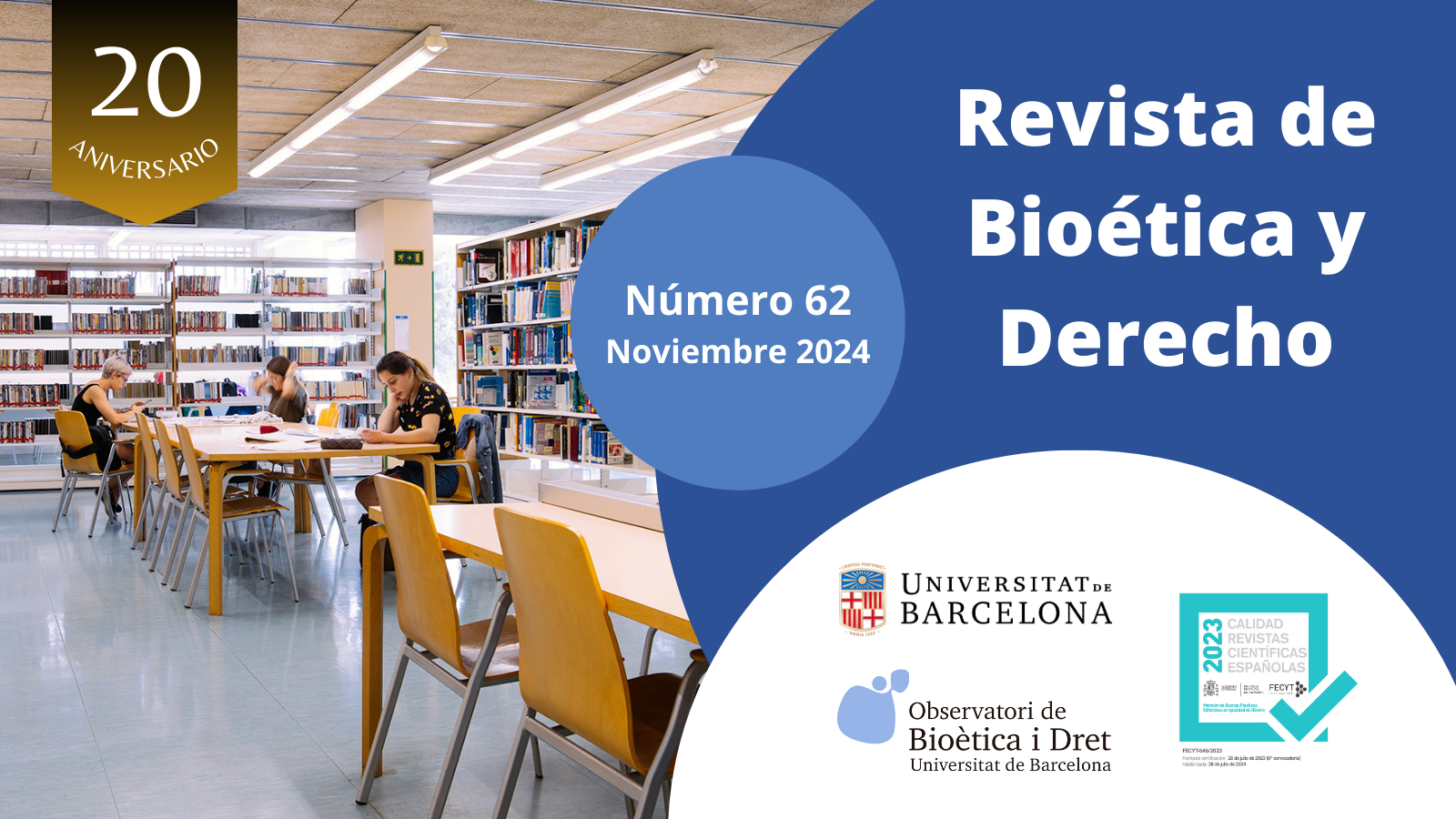Editorial del monográfico - A vueltas con la Neuroética: el cerebro como objeto y objetivo, coordinado por F. Estévez Abad
DOI:
https://doi.org/10.1344/rbd2024.62.47687Palabras clave:
neuroética, inteligencia artificial, neurotecnologíasResumen
La neuroética se ha constituido una rama particular de la bioética necesaria ante el vertiginoso avance de las neurotecnologías. La discusión interminable en relación con su objetivo y alcances resultan factor de retraso frente a la investigación y desarrollo de tecnología que estudia, interactúa y modula la actividad cerebral. Los proyectos de investigación patrocinados por gobiernos, instituciones de interés privado o personas naturales deben cumplir el marco de la investigación y desarrollo responsables; la bioética especializada en los temas del cerebro, las neuronas y las neurotecnologías es una rama de formación fundamental a la hora de establecer la discusión responsable, informada y orientada sobre la neurociencia y sus alcances.
Citas
Acharya, G., Ruf, S. F., & Nozari, E. (2022). Brain modeling for control: A review. Frontiers in Control Engineering, 3. https://doi.org/10.3389/fcteg.2022.1046764.
Al Kuwaiti, A., Nazer, K., Al-Reedy, A., Al-Shehri, S., Al-Muhanna, A., Subbarayalu, A. V., Al Muhanna, D., & Al-Muhanna, F. A. (2023). A review of the role of artificial intelligence in healthcare. Journal of Personalized Medicine, 13(6), 951. https://doi.org/10.3390/jpm13060951.
Alkaissi, H., & McFarlane, S. I. (2023). Artificial hallucinations in ChatGPT: Implications in scientific writing. Cureus. https://doi.org/10.7759/cureus.35179.
Almeida, D., Shmarko, K., & Lomas, E. (2022). The ethics of facial recognition technologies, surveillance, and accountability in an age of artificial intelligence: a comparative analysis of US, EU, and UK regulatory frameworks. AI and Ethics, 2(3), 377–387. https://doi.org/10.1007/s43681-021-00077-w.
Baďurová, B. (2015). Evolution and ethics. E-LOGOS, 22(1), 71–76. https://doi.org/10.18267/j.e-logos.415.
Casado, M., & López Baroni, M. (2018). Manual de Bioética Laica I - Cuestiones clave. Edicions de la Universitat de Barcelona.
Casado, M., Patrão Neves, M. do C., Lecuona Ramírez, I. de, Carvalho, A. S., & Araújo, J. (2016). Declaración sobre integridad científica en investigación e innovación responsable. http://hdl.handle.net/2445/103268.
Casado, M., & Puigdomènech, P. (2018). Document on the ethical aspects of the science ans society dialogue.
Europa.eu. Recuperado el 9 de septiembre de 2024, de https://research-and-innovation.ec.europa.eu/document/download/63eb38a0-6632-4ab0-bb27-b898f553858f_en?filename=ec_rtd_quarterly-ri-review_022023.pdf.
Fastcompany.com. Recuperado el 9 de septiembre de 2024, de https://www.fastcompany.com/91029453/unpacking-the-ethical-issues-swirling-around-neuralink.
Grillner, S., Ip, N., Koch, C., Koroshetz, W., Okano, H., Polachek, M., Poo, M.-M., & Sejnowski, T. J. (2016). Worldwide initiatives to advance brain research. Nature Neuroscience, 19(9), 1118–1122. https://doi.org/10.1038/nn.4371.
Gupta, N. (2022). Ethical considerations in translational research. En Perioperative Neuroscience (pp. 215–228). Elsevier.
Hart, R. (2024, febrero 26). Experts criticize Elon musk’s Neuralink over transparency after billionaire says first brain implant works. Forbes. https://www.forbes.com/sites/roberthart/2024/02/26/experts-criticize-elon-musks-neuralink-over-transparency-after-billionaire-says-first-brain-implant-works/.
Lecuona Ramirez, I. de. (2021). Pautas para evaluar proyectos de investigación e innovación en salud que utilicen tecnologías emergentes y datos personales. http://hdl.handle.net/2445/178612.
Ley de Inteligencia Artificial de la UE. (2024). Artificialintelligenceact.eu. Recuperado el 9 de septiembre de 2024, de https://artificialintelligenceact.eu/es/.
López-Muñoz, F., Boya, J., & Alamo, C. (2006). Neuron theory, the cornerstone of neuroscience, on the centenary of the Nobel Prize award to Santiago Ramón y Cajal. Brain Research Bulletin, 70(4–6), 391–405. https://doi.org/10.1016/j.brainresbull.2006.07.010.
Mulder, L. A., Depla, J. A., Sridhar, A., Wolthers, K., Pajkrt, D., & Vieira de Sá, R. (2023). A beginner’s guide on the use of brain organoids for neuroscientists: a systematic review. Stem Cell Research & Therapy, 14(1). https://doi.org/10.1186/s13287-023-03302-x.
Novakovsky, G., Dexter, N., Libbrecht, M. W., Wasserman, W. W., & Mostafavi, S. (2023). Obtaining genetics insights from deep learning via explainable artificial intelligence. Nature Reviews. Genetics, 24(2), 125–137. https://doi.org/10.1038/s41576-022-00532-2.
Ofosu-Ampong, K. (2024). Artificial intelligence research: A review on dominant themes, methods, frameworks and future research directions. Telematics and Informatics Reports, 14(100127), 100127. https://doi.org/10.1016/j.teler.2024.100127.
Racine, E., Bell, E., & Illes, J. (2010). Can we read minds? En Scientific and Philosophical Perspectives in Neuroethics (pp. 244–270). Cambridge University Press.
Sadin, E. (2023). La vie spectrale. Penser l’ère du métavers et des IA génératives. GRASSET.
Scribbr.com. (2023) Recuperado el 9 de septiembre de 2024, de https://www.scribbr.com/ai-tools/chatgpt-ethics/.
Slaby, J. (2010). Steps towards a critical neuroscience. Phenomenology and the Cognitive Sciences, 9(3), 397–416. https://doi.org/10.1007/s11097-010-9170-2.
Wang, C., Liu, S., Yang, H., Guo, J., Wu, Y., & Liu, J. (2023). Ethical considerations of using ChatGPT in health care. Journal of Medical Internet Research, 25, e48009. https://doi.org/10.2196/48009.
Descargas
Publicado
Cómo citar
Número
Sección
Licencia
Derechos de autor 2024 Fernando Estevez Abad

Esta obra está bajo una licencia internacional Creative Commons Atribución-NoComercial-SinDerivadas 4.0.
 Las/os autoras/es conservan los derechos de autoría de los artículos y autorizan a la Universitat de Barcelona a publicarlos en su Revista de Bioética y Derecho y a incluirlos en los servicios de indexación y abstracts, bases de datos académicas y repositorios en los que participa la revista.
Las/os autoras/es conservan los derechos de autoría de los artículos y autorizan a la Universitat de Barcelona a publicarlos en su Revista de Bioética y Derecho y a incluirlos en los servicios de indexación y abstracts, bases de datos académicas y repositorios en los que participa la revista.
Los trabajos publicados en la Revista de Bioética y Derecho están bajo la licencia Creative Commons Reconocimiento - NoComercial - SinObraDerivada 4.0 Internacional (by-nc-nd 4.0), que permite compartir la obra con terceros, siempre que éstos reconozcan su autoría, su publicación inicial en esta revista y las condiciones de la licencia. No se permite un uso comercial de la obra original ni la generación de obras derivadas.







